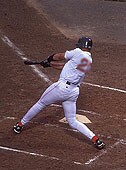
TUESDAY, June 4 (HealthDay News) — Major League Baseball players may be struck out by fatigue as the 162-game season progresses, according to a new study.
In 24 of 30 teams, players’ strike-zone judgment was much better when the season began in April than when coming to an end in September. A separate study found a significant link between sleepiness and MLB players’ longevity in the league.
The findings recently appeared in an online supplement of the journal Sleep and will be presented this week at the annual meeting of the Associated Professional Sleep Societies, in Baltimore.
“Plate discipline — as measured by a hitter’s tendency to swing at pitches outside of the strike zone — got progressively worse over the course of a Major League Baseball season, and this decline followed a linear pattern that could be predicted by data from the six previous seasons,” principal study investigator Dr. Scott Kutscher, an assistant professor of sleep and neurology at Vanderbilt University Medical Center, said in an American Academy of Sleep Medicine news release.
How does sleep deprivation tie into to this worsening performance?
“We theorize that this decline is tied to fatigue that develops over the course of the season due to a combination of frequency of travel and paucity of days off,” Kutscher said.
The researchers tracked how often MLB batters swung at pitches outside of the strike zone during the 2012 season. They sorted the data by month for all 30 teams and compared the first month with the last month of the season.
The information collected on each team was also compared to a statistical model based on the 2006 through 2011 MLB seasons, which predicted a linear decline in strike-zone judgment each month. The researchers noted that their findings contradict the belief that plate discipline should improve over the course of the season due to frequent practice.
“Teams on the East or West Coast, with good or bad records, they all follow the same pattern of worsening plate discipline,” Kutscher said. “This study suggests hitters always demonstrate the best judgment when at bat in the first month of the season.”
The researchers suggested that teams could gain a competitive advantage from focusing on how to manage fatigue among their players.
“A team that recognizes this trend and takes steps to slow or reverse it — by enacting fatigue-mitigating strategies, especially in the middle and late season, for example — can gain a large competitive advantage over their opponent,” Kutscher said. “This may have already occurred, as the San Francisco Giants — an outlier in the study in that their plate discipline improved during the 2012 season — went on to win the World Series.”
Meanwhile, the other study revealed that as players’ self-reported sleepiness increased, the likelihood that they would still be in the league three seasons later decreased linearly. The greater their sleepiness score, the less likely they would still be playing at the time of the follow-up.
For instance, 72 percent of players with a score of 5 on a sleepiness-rating scale were still in the league at the follow-up point. In contrast, only 39 percent of players with a score of 10, and 14 percent of players with a score of 15 were also still playing three seasons later.
“We were shocked by how linear the relationship was,” study principal investigator Dr. W. Christopher Winter, medical director of the Martha Jefferson Hospital Sleep Medicine Center in Charlottesville, Va., said in the news release. “It is a great reminder that sleepiness impairs performance. From a sports perspective, this is incredibly important. What this study shows is that we can use the science of sleep to predict sports performance.”
Winter said that MLB teams could easily implement sleepiness screening as part of their player evaluations.
“I can envision simple questions about sleep being a part of the battery of tests professional organizations use to evaluate prospects,” Winter noted. He added that a player with a sleep disorder that causes excessive daytime sleepiness could benefit from treatment with a sleep specialist.
“That player may suddenly become far more valuable,” Winter said.
More information
The U.S. National Library of Medicine has more about fatigue.

